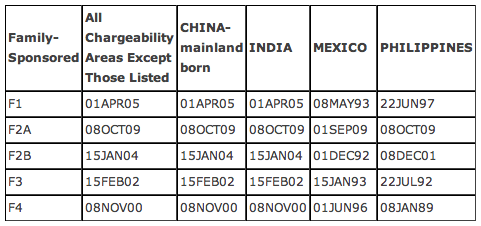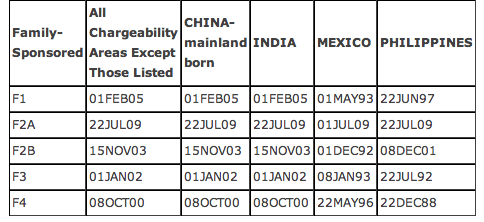
USCIS reported yesterday that 22,323 cap-subject petitions were received already. About one-quarter of those will be counted against the advanced degree cap. Thus far, usage is about the double the amount of last year’s usage. If you are considering an H-1B petition this year, call the attorneys at Romben Law, APC for your consultation now or contact us at here.—ecf
F-1 Cap Gap and H-1B Issues

F-1 cap gap issues cause a lot of confusion, but here is a quick guide to help you all you need are clear answers. I posted a similar blog entry last year. The full guidance from USCIS can be found here:
Applying for TPS – Syria

Time to apply? Temporary Protected Status (TPS) for Syrians in the US! The USCIS has just announced that Syria will now be a designated country for temporary protected status. Due to the political instability in Syria, Syrians who are now in the United States will soon be able to apply for TPS which will allow them to be granted employment authorization and for extensions of the TPS designation is extended for Syria. The initial TPS designation will be for 18 months. USCIS has instructed applicants NOT to submit applications yet but applications may be prepared now in anticipation of more guidance next week. Remember that TPS is not automatic and applicants will have to show their eligibility, and background checks will still be conducted of all applicants. Those who will be found ineligible are those who have multiple convictions or other factors but certain noncriminal and non-security grounds can be waived. If you are interested in applying for TPS, call Romben Law, APC for a consultation. —ecf
EB-2 China and India Update: Predicted Regression Date of Aug. 15, 2007

This is just in from AILA. It has been reported that in the May 2012 visa bulletin, the USDOS will retrogress the priority dates for China and India EB-2 to August 15, 2007. The April 2012 priority dates are at May 1, 2010. It’s still too early to know how long the regression will last, or when there will might be forward movement again this fiscal year. USDOS did report that demand for this preference category from China and India remains very high. Cases will still be “preadjudicated” and held by Dept. of State under their “pending files” in order to be ready when visa numbers can be used for cases filed after May 1, 2010. —ecf
EB-2 Retrogression on the Horizon

Bad news for those watching in the China and India EB-2 preference category priority dates. It is reported on March 16 that the US Department of State will likely retrogress the EB-2 priority dates to around August 2007 in the May or June 2012 visa bulletin. The April 2012 visa bulletin priority dates for China and India are at May 1, 2010. All other countries are current.
The reason given for the anticipated retrogression is that USDOS anticipates there will be no “spill down” from any unused EB-1 numbers, meaning all the allocated immigrant visa numbers for Fiscal Year 2012 will likely be used this year in the employment first preference category. This is also an important note for EB-1 applicants: if you are planning an employment first preference case, you might want to get that case in earlier than later. Call the business immigration attorneys at Romben Law, APC to plan your employment cases now. —ecf
PERM Processing Times

The days of PERM processing within a week or two are long gone, but the business immigration attorneys at Romben Law, APC, have seen a decrease in time for adjudications at US Dept of Labor.
Although processing times still vary, we have recently seen certifications within 2 months of filing. The icert portal reports that analyst reviews are hovering around the submission date of November 2011. That’s about 4 months from submission to getting an initial response.
In the world of audits, Department of Labor reports that they are working on cases originally submitted around July 2011. As many had expected, supervised recruitment is still an issue. In a report summarizing PERM cases filed between October 1, 2011 to March 5, 2012, the Office of Foreign Labor Certification (OFLC) confirmed 26,100 active cases as of March 5 with only 4% of cases undergoing supervised recruitment. While it’s still early in the fiscal year, we also know it takes time for a case to proceed from submission to audit, it was notable that a full 26% are in audit review. We may expect an increase in supervised recruitment requests.
April 2012 Visa Bulletin
For you eager watchers of the USDOS Visa Bulletin, you know that the visa bulletin gets published about 2 weeks prior to the start of the new month. This month, we are seeing steady movement in the employment-based third preference. We are still working our way through the bulge of 2006. It has been excruciatingly slow, but those of you with 2006 priority dates are now seeing the light at the end of the tunnel and now is the time to call Romben Law, APC to ensure that your documentation is updated and ready for adjustment or consular processing, at long last. If you have changed employers and are unsure of your status, or ported, perhaps travelled and entered on advanced parole or have been terminated from your job, we’ll need to talk! —ecf
The family-based chart:
 The employment-based chart:
The employment-based chart:
Preparing H-1B Petitions With Multiple Worksites
 H-1B news. April 1, is just around the corner. The so-called “H-1B season” is upon us with preparations in high gear for early filings. While I won’t give predictions or insight into how long this quota will last, the important thing is to prepare your case well and do it as early as possible.
H-1B news. April 1, is just around the corner. The so-called “H-1B season” is upon us with preparations in high gear for early filings. While I won’t give predictions or insight into how long this quota will last, the important thing is to prepare your case well and do it as early as possible.
This blog entry will focus on a 2010 H-1B USCIS memo that was updated on March 12, 2012 discussing “employer-employee” relationships. Simply put, this memo gives guidance on how to prove up cases involving independent contractors, self-employed beneficiaries, and beneficiaries placed at third-party worksites. Having represented a range of employers with H-1B workers who travel about for their jobs in technology, accounting and finance, and business consulting, the attorneys at Romben Law, APC know the challenges facing employers in initial H-1B petitions, updating LCA requirements, and keeping employees in status throughout their H-1B stay, wherever they may be performing services. Such employers must know that they have additional responsibilities in preparing itineraries and documenting prevailing wages in different geographic areas.
If you or your employer have a non-traditional employment arrangement, such as one involving different worksites, contact the attorneys at Romben Law, APC for a initial consultation. —ecf
March 2012 Visa Bulletin
The March 2012 Visa Bulletin has been published and we are seeing some movement.
The family-based chart:
 The employment-based chart:
The employment-based chart:
Why You Need to Update Your Address with USCIS
All non-US citizens inside the US are required by law to notify the government of any changes of their addresses. This is a cautionary tale about what can happen if they don’t.
One recent Monday evening, a client came to me because, just a few short hours earlier, his wife had been arrested and taken into custody during their immigration interview. During our consultation, he provided me with the following background information.
His wife previously lived in Minnesota. Her then-husband didn’t trust lawyers, so they submitted all of the paperwork to USCIS on their own. Unfortunately, the marriage didn’t work out and they got divorced. Wanting a fresh start, she moved to California.
 Immigration Visa Attorney Blog
Immigration Visa Attorney Blog

